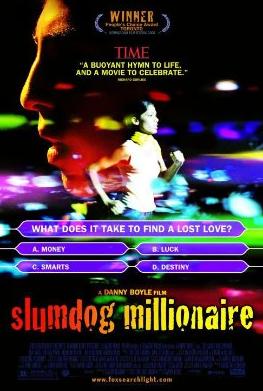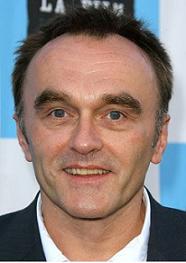
Main Page
Interviews Menu
Alphabetical Menu
Chronological Menu


Danny Boyle directs Slumdog Millionaire about a Jamal (Dev Patel), a teenager from the slums of Mumbai, India, who proves to a police inspector (Irfan Khan) that he didn't cheat on the Hindi version of "Who Wants to be a Millionaire?", so he recalls the moments from his past where he learned each answer. Those moments include going on the run with his older brother, Salim (Madhur Mittal) and pining for the love of his life, Latika (Freida Pinto), who fuels his passion to win the show's prize money. Danny Boyle has previously directed a wide variety of films such as Sunshine, Millions, 28 Days Later, The Beach, Trainspotting and Shallow Grave. It was a real privilege to interview him. Fox Searchlight Pictures releases Slumdog Millionaire on November 12th, 2008 at the Angelika Film Center and Lincoln Plaza Cinemas. NYC MOVIE GURU: How did Fox Searchlight end up distributing Slumdog Millionaire? DB: Warner Independent Pictures had the film and then Warner Brothers closed [it] down, which meant we were an orphan. Obviously, thereís no profile for the film because thereís nobody in it that anybody in the West really knows about. Itís an odd little idea. We thought that that was it. Somehow, the Toronto Film Festival and Telluride Film Festival got hold of it and demanded it. Warner Brothers showed it to Peter Rice, [president of] Fox Searchlight. He and all these guys sat down and watched it and loved it. Peter bought it off Warner Independent and [then] we went to Toronto and Telluride. NYC MOVIE GURU: How do you feel about Bollywood films? DB: They are amazing because theyíre not to our taste because theyíre too long and have song and dancing, but theyíre more about these amazing moments about melodrama or song. Theyíre not all about a smooth overall arc. Itís more about enjoying the moment. One of the things I love is how the music is mixed in Bollywood film because itís right up front. We try to hide music so that it works behind your ears and youíre not even aware that itís playing because youíre being manipulated. So, to do the music was fantastic fun and so bold. NYC MOVIE GURU: How do you find the right balance of entertaining the audience and provoking them intellectually? DB: I try to use popular means, which is sometimes [through] genre. If you call it a genre, in Western terms, itís a Dickens genre; in Bollywood terms, itís a classic good brother/bad brother [genre]. Then I try to stretch [the popular means] as much as I can, but not only entertaining but interesting as well. Thatís what I try to do every time, if I canó-not always with great success or any success, [though]. I donít want to make private films, [so-to-speak]. Iíd go and watch them, but theyíre not really my forte. I love thing when you can feel them catch the audience and you can feel yourself caught with the audience watching it. How you balance those things comes down to the story and the writers. NYC MOVIE GURU: How much control did you have as a director throughout the production? DB: The biggest thing is that I have no control. If Iíd seek control, Iíd just find madness. Directors are usually about control, [but] it doesnít work like that. Itís too complicated. Everything inseparable and I embraced that wholeheartedly. Itís decent film because I did that. Because I did that, the people that I worked with, mostly a Bollywood crew, respected and trusted me because I respect and trust them. I canít explain it [because] Iím not a hippie, but you realize why hippies can talk about it. It is something beyond the rational, beyond the actual, specific control thing. Itís a spirit thing. Suddenly, the film begins to come back to you and you think, ďWeíre getting the film and itís way beyond what we could have thought.Ē Technically, we used digital cameras because it allowed us to be flexible and move very easily and freely. If you use the big film cameras, people would be obsessed with movies there and they say, ďThereís a big movie camera over there. Letís gaze into it.Ē So, we used small cameras. We took about 10 crew [members] from the west. The rest of the crew are local. Thereís a co-director, [Loveleen Tandan] on it who began as a casting director. She was incredibly important to me. I had her with me the whole time. She was also someone who I could bounce things off of. Because we worked together for such a long time, she was able to say to me, ďyouíre wrong.Ē Without her, the first assistant director, Raj Acharya, and the live sound guy, Resul Pookutty, the film would have been a quarter of what it is now. NYC MOVIE GURU: What was it like to direct actor Dev Patel? DB: Heís got such a bright sense. Itís lovely to see him grow. He was 17 [during production]and had his mom with him. We had to get rid of [her], [but] not literally. (laughs) NYC MOVIE GURU: How do you feel about Slumdog Millionaireís R rating? DB: The original contract was for PG-13, so I took that very seriously in my responsibility. Thereís very little in the film that you see that would confound guidelines, but they said itís too intense. The intensity of it says that itís an R. It wasnít even about specific little scenes that you could change or edit, they just [talked] about the intense experience. I did want to make it an intense experience. I like extremes and that you feel the film constantly at massive extremes. NYC MOVIE GURU: What happened when you tried to appeal the rating? DB: It was fruitless. To give Peter Rice his credit, he said, ďListen, just finish this film and weíll go with whatever certificate they happen give it. I donít think you should distort the film any more to try to chase the certificate.Ē NYC MOVIE GURU: What was it like cutting the film down to exactly 2 hours? DB: The longest film Iíve ever made was about 100 minutes, so I was really alarmed when I saw how long it was. I cut a lot of stuff. Thereís some wonderful stuff with the show host going to the police station and the police commissioner whoís very funny, but it was just confusing and too long, so I just cut it [out]. Itíll all be on the DVDís [extras]. NYC MOVIE GURU: What other scene was cut? DB: We did have an extra question, actually. We cut it for many reasons. One was for length. The other was because it was slightly confusing. Youíll have to watch the DVD to see it. It was a question about a British architect, Frederick Stevens, and what monument in India did he build. The options were: Taj Mahal, Howrah Bridge, India Gate or VT Station. Thatís why at the end of the film, Jamal rather bizarrely sat on the statue of that British architect. Thatís why itís there because it was originally one of the questions that we had to cut to get the film down to [its running time of] exactly 2 hours. NYC MOVIE GURU: How do you think Slumdog Millionaire would appeal to those living in the UK and America? DB: I thought that it might work in the UK because of the connection with India. Weíve got a very large, visible Indian population [there]. Thereís all the history. [Dev Patel] is on the show ďSkinsĒ, which has a bit of a profile. So, I thought it might work there, but I had no idea [how it would work] in America. What I hadnít really thought about is how important the underdog idea is in America. If you get it right, itís so part of the psyche in America---the belief that if somebody has a dream and they stick to it, they can get there, even if everything apparently stacked against them. The country is built on that idea. We romanticize it and, obviously, people are very cynical about it outside America, but it, actually, is really pure as well. I had forgotten that and I think thatís one of the reasons that it appeals or itís used to appeal. NYC MOVIE GURU: Whatís so special about recording live sound in India? DB: Live sound in India, especially in Mumbai, is very difficult. Itís only for the insane to really try to get it. Heís one of the guys who tried to do it. He has these 12 guys in white safari shirts and theyíve got these sticks. They all scattered off and started hitting people to keep them quiet. (laughs) So, we had to get rid of the sticks. NYC MOVIE GURU: What did you learn about the slums of Mumbai? DB: There are pejorative connotations to it. Theyíre not really like that. Theyíre actually just place where people live---not very wealthy people, but theyíre actually incredibly resourceful people. Ironically, theyíre not provided for by the state and council. Thereís not enough running water and the sewage, particularly, is just not there. But the people themselves are absolutely amazing. Their homes are clean and theyíre very generous once you find the right way in. You have to go by all the guidelines of their society. They were very excited that we were making a film there. [Also], they were keen to make sure that we didnít just say they were poor. They wanted it to be an exciting film and didnít want it to be a pitiful documentary about what weíre going to do with all the poor in India. They hate all that. We were very privileged to work there. NYC MOVIE GURU: What lessons did you ultimately learn from your experiences filming in India? DB: Since I went to India to make it, I learned something about destiny and about fate and the way things work. I never really believed it, but people believe it there in a way thatís quite meaningful. Main Page Interviews Menu Alphabetical Menu Chronological Menu ______________________________________________________ |
The NYC Movie Guru
themovieguru101@yahoo.com
Privacy Policy